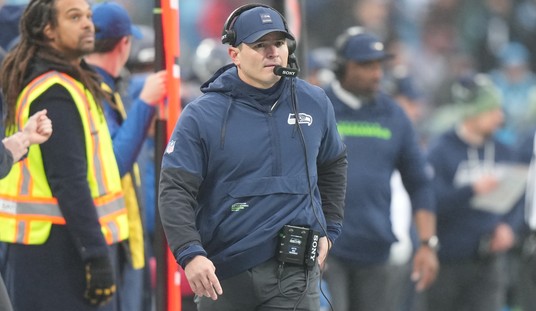And so the somewhat sordid tale of the 2009 election season — our meager dose of political catnip in an off-year — has drawn to a close, leaving Republicans and conservatives with a bit of a hangover and lingering questions of where to catch the bus. The sideshows taking place in Virginia, New Jersey, and an obscure, mountainous patch of upstate New York will now give way to the real battle of the 2010 midterms, which kick off in earnest today. But did we learn anything?
The easy headlines have already been picked off and pretty much wrote themselves. Republicans “pull two out of three!” The contingent of motivated activists who consider themselves the only true conservatives in America were pounding their chests, convinced that they had unwrapped the last of Willy Wonka’s golden tickets. This must surely be the moment when they would seize the wheel of power and drive the godless RINOs and squishy moderates from the party as they march toward victory.
Really? Let’s start off our tour in the Empire State’s 23rd district. Thanks to a flood of out-of-state money and what many of the locals considered an embarrassing amount of national media attention, the Republican candidate was hounded out of the race for the sin of being too liberal. In her place, a disgruntled champion of the state’s Conservative Party grabbed headlines across the nation, causing no shortage of ill will among national GOP leaders and potential presidential candidates in the process. And the result? The seat still wound up going to the Democrats, the party which had managed to avoid holding it since civil war veterans were voting. Before you begin feeling too badly, though, the loss doesn’t portend as much as you may think. The bad news is that, even had Hoffman prevailed, it wouldn’t have meant what you thought either.
People were busily painting this as some sort of a proxy battle between Sarah Palin and Joe Biden. How embarrassing is it to lose to Joe Biden? But in reality, Hoffman’s national supporters forgot the rule of thumb when it comes to third-party candidates: they are there to spoil the chances of the favorite. Hoffman’s campaign was an aberration in that he so spoiled the dominant party’s candidate that she was driven from the field of battle, but he still wound up performing the normal function and handing the win to the opponent’s team.
New Jersey was, in some ways, an even stranger story. Chris Christie’s surprisingly comfortable margin of victory will clearly go down on paper as one more in the win column for the GOP. But careful observers are taking away a somewhat deeper message. First, they know that Jon Corzine should have never even gotten close to winning this one, and the only reason he did was the fractious nature of the New Jersey Republican Party and the obstinate tenacity of Chris Daggett. And what of the governor-elect himself? Is he a “real conservative” who will lead us out of the wishy-washy marsh of John McCain’s “Gang of 14” nightmare?
Well, he speaks the language of fiscal conservatism so desperately needed in the economically floundering Garden State. But a quick look at his issues page reveals a candidate who might not exactly fit in at a Club for Growth meeting. Christie is very quick to point out that he is “pro-life” but then goes on to dissemble about the need to “reduce the number” of abortions and nibble around the edges with talk of parental notification. In fact, aside from using the pro-life buzz phrase, his position is barely discernible from that of Hillary Clinton during her failed presidential bid. And how about gun control? Don’t look for any indication from Christie. There’s not a word about the Second Amendment or the rights of gun owners. Let’s face it … Rick Santorum he ain’t.
Virginia was the most clear-cut of the contests, lacking in third-party razzle dazzle and producing a definitive outcome. Bob McDonnell checks all the right (or Right) boxes on gun control, abortion, and gay marriage, but he ran endless commercials in the northern part of the Old Dominion state where the word “Republican” was never mentioned once. While his opponents chased him around, waving a copy of an old paper he published, Bob seemed to seek every opportunity to present a measured, moderate tone, and it obviously caught the interest and support of Virginia’s voters. But the whole time, McDonnell looked more like he was running away from the Republican Party than running on their ticket.
Returning to the mess in New York for a moment, we’ve heard more than a few people sounding confused and asking how things arrived at such a sorry state of affairs. How did a few people manage to put a nominee in place that was so far from the conservative fold? Shouldn’t we have done a better job in the primaries? Well, we may not care for secret deals cut in smoke-filled rooms, but the first thing you need to know is that there was no primary for that election. And they weren’t breaking the law. In fact, they were acting in accordance with a little-noted codicil in section 6-116 of New York election law. When there is a vacant House seat, the nominees will be selected by “a majority vote of a quorum of the members of a county committee or committees last elected in the political subdivision in which such vacancy is to be filled.” If you want to fix the system, one place to start would be taking a long, hard look at our elections laws across the various states.
This, of course, still leaves the question of whether or not the national Republican powers that be should have been backing their own candidate in the first place. They play on a team. They don’t have the same level of luxury in picking and choosing which Republicans they back. They’re in the game to win. But how strong that support needs to be is certainly a valid topic of discussion.
And while we’re on the subject of pointing out that the national party doesn’t exactly have clean hands, there is the question of funding. How is it that they pumped more than one million dollars into Ms. Scozzafova’s campaign, yet failed to send more than a few direct mail pieces to David Harmer? The election may have initially looked out of reach, but it wound up being much closer than many people imagined. Even a close loss within the margins in California’s 10th district would have sent shock waves through the Democratic ranks far more than seeing a third-party conservative in New York taking a seat the GOP had held since the 1800s.
If we’re to learn anything useful from this exercise as we move into the battle of 2010, it should be one of the oldest lessons which some of us seem to have forgotten. All politics is local … always. You can not succeed by “taking the party” back for one group of exclusive ideologists without regard for the demographics of the electorate in question. You may feel free to run a Sarah Palin or a Rick Santorum in every single district in the nation, but you’d best be prepared to become a permanent minority. Particularly in the House races, we should remember that the voters in the district have the final say. And they won’t be any more thrilled at having the bloggers from Red State tell them who to nominate than some of the moderate blue state voters would be at receiving marching orders from Daily Kos.









Join the conversation as a VIP Member